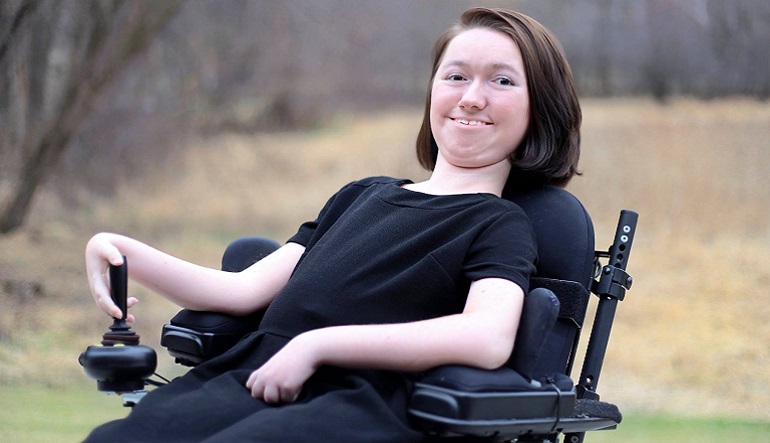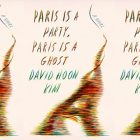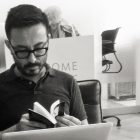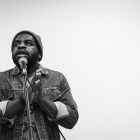“The wolf finally frees itself”: Talking With Brianna Albers
Bodies in literature always bear the first marks of difference. What isn’t recognized as “normal” (meaning, not perceived as male, cis, straight, white), always verges on the monstrous, to be rejected or feared, or at the very least cloaked in mystery. Perceptions and representations of disabled bodies add another layer of complication: too often the disability becomes a cipher, a placeholder meant to signify some deeper flaw or tragedy. Wanting to push this line of thought further, I talked with Brianna Albers. Albers is a young poet who works as the Spotlight Series Director for the literary magazine Winter Tangerine, published her first collection, Why I’m Not Where You Are, with Words Dance Publishing in 2016, and recently founded Monstering, a literary magazine by and for disabled women and non-binary people.
A.K. Afferez: I love the concept of the monster around which you’ve centered the magazine, and how you link it precisely to portents and omens. There’s a potency there that we must reclaim. And I can’t help noticing the –ing form: is there a difference between the concept of “monster” and a process, a kind of dynamic associated with the monster?
Brianna Albers: I don’t necessarily think monsters are born monstrous; they have origin stories, even if the norm refuses to acknowledge that. Monsters are living, breathing creatures, undergoing the same kind of processes humans do in pursuit of transcendence, and Monstering is a testament to that journey. It’s an acknowledgement—a recognition; a celebration—of that monstrosity as it comes alive, and I wanted to capture this sense of becoming. This sense of…present tense. Ongoing. Never-ending, if you will.
For me, personally, monstering is about accepting who you are, and stepping into that space of awareness. I don’t want to deny my disability. I don’t want to shove it into a closet, or whatever it is you do with monsters these days; I don’t want to feel shame or grief over this integral piece of my identity. If anything, I want to scream about it till my voice goes hoarse. You know? It’s who I am. Or, rather, it’s made me who I am, and I’m proud of it. I love it. So monstering, for me, is a proclamation. Something to herald my coming—every fearful, blistered, unlovely part of me.
AA: Why make a literary magazine for disabled people who are specifically women and non-binary, besides the fact that nothing like it, to the best of my knowledge, existed before? It reminded me of the number of female monsters in myths and legends, that crystallize the inability to understand the Other.
BA: I think there’s a lot to be said for the legacy of the sociocultural monster and how it relates to gender expression. It’s something I want to explore in future issues of Monstering. But I’ll be honest in saying that, when the idea came to me, the implications of it were far from my mind. Disabled women and non-binary people undergo so many specific experiences, and a lot of that specificity has to do with intersecting identities, which is why Monstering has always been by and for that demographic. I wanted this thing—whatever it ended up being—to speak to that, to the resiliency and heart of my people. The world erases us, dehumanizes us, subjects us to ism after ism, and I wanted Monstering to stand in resistance to that. So I worked with intention, and from that intention came all this.
AA: When I address my disability through writing, I’ve noticed that I shed the kind of dualistic vision that is so often forced upon us, the one that sees body and mind (or soul, or whatever you want to call it) as separate, and that often reduces the latter to the former. Through writing however, I no longer feel like just a body that’s been marked as irrevocably abnormal, because it’s female, queer, and disabled–I get to control and redefine myself in ways that elude the usual perception of disability. Does that happen to you?
BA: It’s interesting, really, because so many people are quick to remind me that my disability doesn’t define me—when, in fact, it does. And that’s okay, because it’s something I’m allowing to happen. It’s a part of my identity I’m embracing, willingly. Discrediting or ignoring my disability is, I think, the quickest way to self-violence, because I’m limiting myself. I’m denying myself the very heart of who I am. But by acknowledging and celebrating disability and the role it plays in my life, I turn those conceptions into something I can control, especially when it comes to language. Through writing, I get to take my disability and wring a kind of grace from it. Which, again, comes back to monstering, and the process behind it. From pain to power, in a way.
AA: Can you tell us a bit about the workshop you’re helming along with Winter Tangerine? Titled “Hollows Shout the Mountain Down,” it’s meant to examine “the coexistence of monstrosity, humanity, and disability; the power of abnormality and subversion; the resistance inherent in the disabled body and mind; the emotional landscape of disability; the interaction of disability and the self.” What a program!
BA: I’ve wanted to do a workshop for disabled writers since my first day with Winter Tangerine, and the fact that I get to bring this thing to life alongside my best friends is just…unbelievable, really. There’s something special about our workshops. A sense of community, among other things, and I’m so excited to see that take root among my people. There’s a lot of talk about safe spaces nowadays, but this workshop is going to go beyond that, headed straight for hallowed ground. We’re not just going to celebrate disability; we’re going to lay it bare, and really interrogate what it means to accept and embrace disability—monstrosity—in our writing.
AA: Could you recommend writers who are disabled women and non-binary people whom you love?
BA: Jillian Weise and Joanna Valente are giving Guest Seminars during “Hollows Shout the Mountain Down,” so I’m currently obsessed with their work; Joanna has a poem in the inaugural issue of Monstering, and Jillian speaks so intelligently to my love for cyborgs.
People wishing to apply to “Hollows Shout the Mountain Down” can find the form here. The workshop will run January 15-21; there are no application fees; applications are open until December 25th; and tuition is $60 with the possibility of financial aid.




